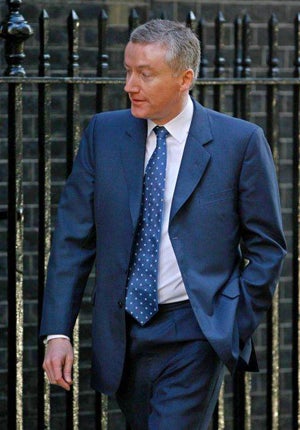Goodwin's affair at bank exposed after peer breaks gagging order

The High Court dramatically lifted part of a gagging order brought by Sir Fred Goodwin yesterday as the Government said it was planning to instruct the courts to give priority to the right to freedom of expression when hearing privacy cases. Mr Justice Tugendhat, Britain's senior judge on media cases, ruled that Sir Fred could be identified after a Liberal Democrat peer used parliamentary privilege to reveal that the former chief executive of the Royal Bank of Scotland had been having an affair with a "senior colleague".
The Culture Secretary, Jeremy Hunt, yesterday met the Justice Minister, Ken Clarke, to discuss how courts should be instructed to give precedence to freedom of expression over privacy after the granting of a wave of super-injunctions. Mr Hunt said there was no requirement for a privacy law, but that changes to existing legislation could be introduced to ensure that the courts followed the "expressed will of Parliament" and ruled "in favour of freedom of expression".
Today, a committee led by the Master of the Rolls, Lord Neuberger, will deliver a much-anticipated report on the use of super-injunctions following a long review of the process. It will be released at the High Court tomorrow in the presence of the Lord Chief Justice, Lord Judge. Yesterday's developments look set drastically to curtail the growing use of all-encompassing super-injunctions, which have triggered an outcry among media organisations and freedom of expression campaigners. The courts have remained steadfastly impervious to breaches of the gagging orders on social networking websites such as Twitter – where the subjects of injunctions have been repeatedly named and shared by hundreds of thousands of people . But Mr Justice Tugendhat acted promptly yesterday after Lord Stoneham, acting on behalf of his fellow Liberal Democrat peer Lord Oakeshott, stood up in the House of Lords and asked of Sir Fred's having taken out a gagging order: "Would [the Speaker] accept that every taxpayer has a direct public interest in the events leading up to the collapse of the Royal Bank of Scotland?
"So how can it be right for a injunction to hide the alleged relationship between Sir Fred Goodwin and a senior colleague? If true it would be a serious breach of corporate governance and not even the Financial Services Authority would know about it."
Lord McNally, the deputy leader of the Lords, replied: "I do not think that it is appropriate from this dispatch box to comment on individual cases, some of which are before the courts."
It also emerged in the debate that the Ministry of Justice did not know exactly how many super-injunctions were active. "I do understand that the Ministry of Justice chief statistician is looking into the matter and we do hope to be able to give those figures shortly," Lord McNally said.
Speaking at the Department of Culture, Media & Sport yesterday afternoon, Mr Hunt said he had spent part of the morning in talks with Mr Clarke, discussing privacy legislation. "I do think it's bordering on farce; I think it's an example of where our regulatory structures have just been overtaken by technology," he said.
The Culture Secretary added that the guarantee to a right to privacy enshrined in the Human Rights Act meant that "we don't believe privacy law is the way forward", but said changes to existing law might be introduced to ensure that the courts gave priority to freedom of expression in privacy cases.
Section 12 of the Act made clear that Parliament had always intended this to be the case. "We are not ruling out potentially the need for legislative changes," he said. We want to make sure that the will of Parliament is properly reflected in what the courts do... and it's currently in the legislation that where there is a conflict between privacy and freedom of expression the pendulum should be tilted in favour of freedom of expression. We want to look into whether in practice that is happening and whether we can make sure that that clearly expressed will of Parliament is what happens in practice."
The interpretation will anger lawyers, who believe the uproar over super- injunctions is being manufactured by the tabloid press. Mark Thomson, who represented Sienna Miller in her action over the illegal hacking of her mobile phone by the News of the World, said it was wrong to say that Human Rights law was intended to favour freedom of expression.
"The suggestion is just not right – as is clear from the Hansard script of what [former Lord Chancellor] Lord Irvine said in the House of Lords when introducing the Human Rights Bill in 1998," he said. "What the politicians are now doing is dancing to the tabloid drum of outrage."
Join our commenting forum
Join thought-provoking conversations, follow other Independent readers and see their replies
Comments
Bookmark popover
Removed from bookmarks